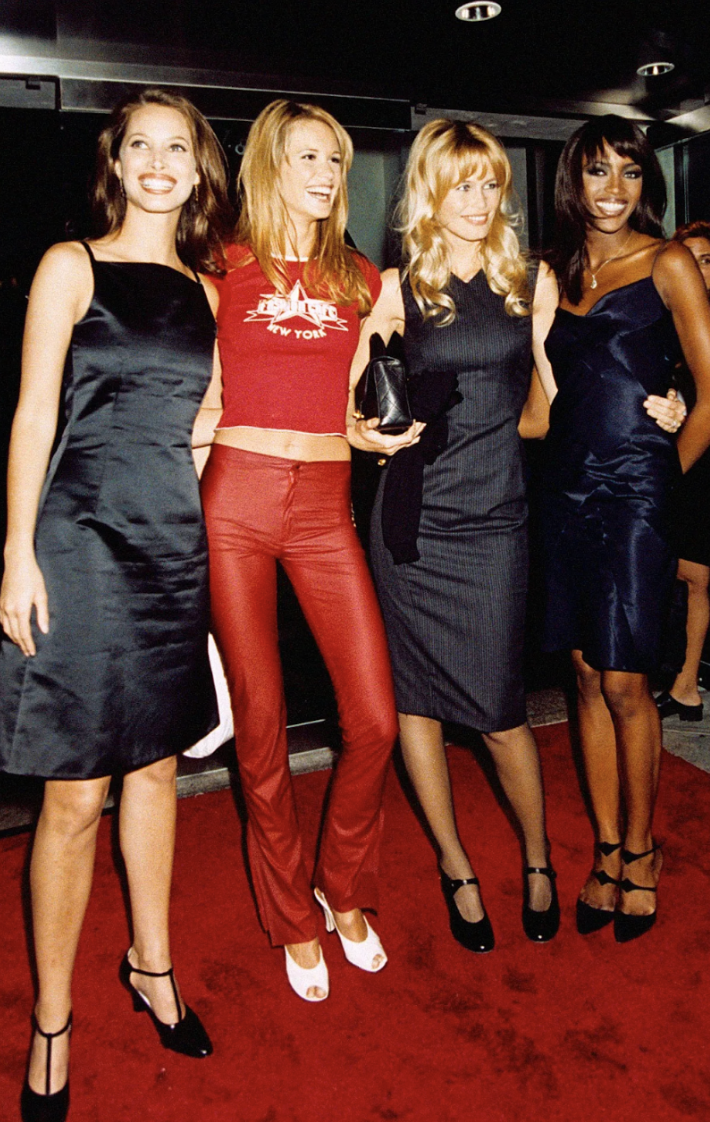Bringing the Runway to Rockefeller: The Rise and Fall of Fashion Café
Graphic by Isabelle Hauf-Pisoni.
At the height of the 90s supermodel craze, an international fashion-inspired restaurant chain headed by four of the most in-demand “supers” seemed like the jackpot. And that’s exactly what Fashion Café was … in the beginning. Just three years later, mounds of debt and lawsuit threats forced the chain to close its doors worldwide forever. How did Fashion Café go from one of modeling’s most groundbreaking business ventures to number 70 on author Matt Haig’s list of “the 100 Biggest Branding Mistakes of All Time?”
Our story starts in 1989, when 22-year-old entrepreneur Tommaso Buti moved from Italy to the United States. He quickly founded Focaccia: a gourmet food delivery service that rapidly grew a positive reputation among Wall Street elites. He eventually sold his stake in the company, using the money to open Fashion Café with his older brother, Francesco, in 1995.
The brothers hoped to capitalize on the frenzy surrounding the design industry at that time, naming menu items after famous supermodels and decorating the dining room with well-known garments from the screen and stage. They brought on Naomi Campbell, Elle Macpherson, Claudia Schiffer and Christy Turlington as spokesmodels and brand advisors. According to Macpherson, the models helped plan the “5 M’s:” mood, marketing, merchandising, memorabilia and menu. Fashion Café opened in New York’s Rockefeller Center in 1995. The Associated Press described the flagship location as “a couture version of Planet Hollywood and the Hard Rock Café.” The team later opened seven more Fashion Café locations around the globe.
Image courtesy of Getty Images.
For a while, Fashion Café did exactly what its founders hoped it would. Merchandise sales raked in massive profits for the brothers, who became infamous for their indulgent lifestyles (Tommaso was rumored to have thrown a $20,000 birthday bash with his then-wife, model Daniela Peštová). Chain expansion proved profitable for the models, who earned as much as $100,000 with each appearance at a new location’s launch party. But this bliss didn’t last for long.
The Fashion Café’s steadily growing empire came crashing down in 1998, when tax agents issued warrants against the Butis for months of unpaid taxes. The same year, the State Labor Department filed liens against the café for not paying unemployment insurance premiums, and the Rockefeller Center took legal action, claiming months of unpaid rent and utility fees. In addition to the copyright and trademark lawsuits the Butis had been battling since the restaurant’s opening, they now faced a total of $15 million in lawsuits from partners. Turlington and Schiffer jumped ship, and the restaurant closed all eight locations by the end of the year.
Though the spokesmodels had put the café behind them, the story doesn’t end there for the Buti brothers. That same year, Donald Trump announced he was founding a modeling agency, Trump Management Group, run by Tommaso. Trump told New York Magazine, “Tommaso loves women and women love him back. He's a natural to run a modeling agency.”
Image courtesy of Getty Images.
Though Fashion Café is now hailed as a major branding failure fronted by fraudulent entrepreneurs, it paved the way for the brand deals, business collaborations and model-designed lines of the current age. Bella Hadid’s Kin Euphorics drinks and Winnie Harlow’s Cay Skin SPF products both rely on the same marketing tactics that Fashion Café did – using a recognizable name to make a niche item somehow fashion-related. So the next time you pick Kendall Jenner’s 818 Tequila off the shelves at Binny’s, I hope you think of Fashion Café.
But in 2000, the Butis were indicted by the U.S. Attorney’s Office on federal charges of fraud, money laundering and conspiracy. The New York Times reported that the 51-count indictment accused the brothers of using investors’ money for personal expenses (like the rumored $20,000 birthday party and Tommaso’s $25,000-a-month apartment) and falsely claiming they invested millions into the café. Tommaso was arrested and stood trial for similar charges in Italy, where he was acquitted. Before Tommaso could face trial in the states, President Trump granted him a full pardon on his last day in office.
Fashion Café eventually faded into the background of 90s fashion history as more prominent and longer-lived business ventures took its place in the minds of the American public. The brand lives on primarily through its merchandise, which occasionally appears on resale websites at inflated prices. The restaurant’s iconic T-shirt, which sold for $16 at the New York launch, is currently listed on eBay for $615.
Image courtesy of PA Photos.




